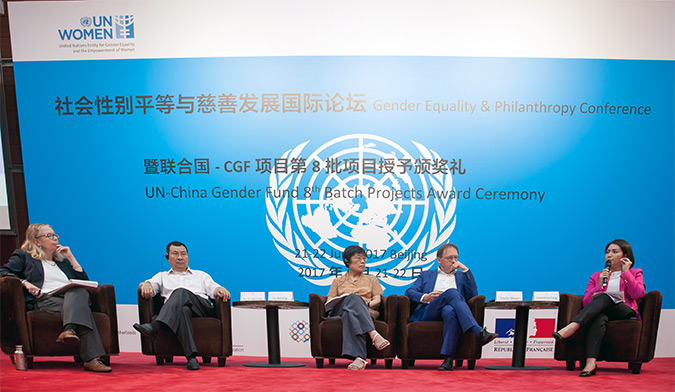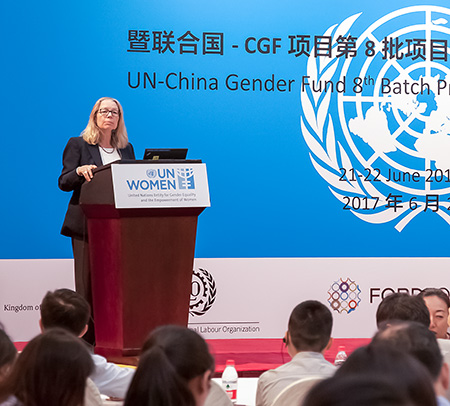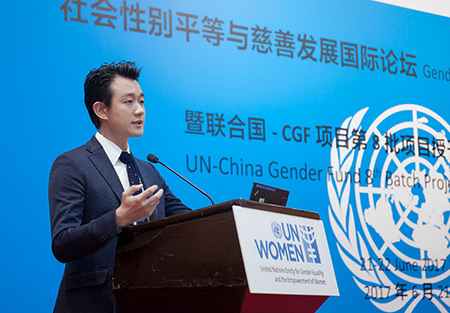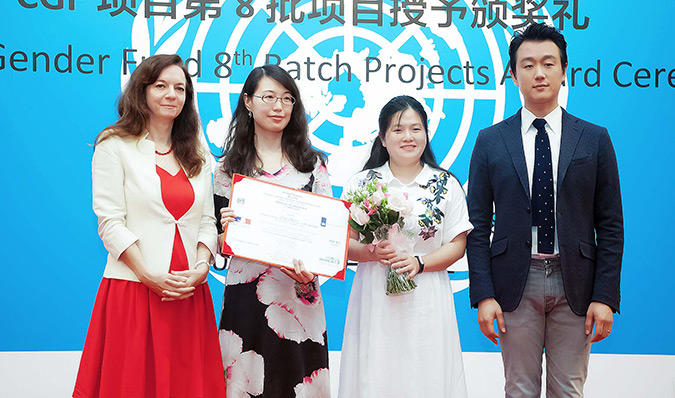How can philanthropy best benefit women in China?
Date:
Author: Jiahui Lin
Beijing, China — Funders of development projects seek to maximize their impact on society, but how much do women in China actually benefit from these projects?
Experts from funding organizations, development projects, United Nations agencies and others tackled this question at an international Gender Equality and Philanthropy Conference in China, organized by UN Women on 21-22 June. As Elizabeth Knup of the Ford Foundation said at the conference: “Whatever we are funding, we need to understand the way in which the issue affects people of all genders.”

Liu Bohong, a professor at China Women’s University and a well-known expert on gender issues, gave an example of how development funds may never benefit the people they were intended to benefit. After it was found that repeated use of the same sanitary pads caused infections and even cervical cancer among women in rural China, the women were given money to purchase new pads. But most of the women wound up using the money instead to buy cigarettes for their husbands or schoolbags for their children, she said.

Panelists at the conference said there is no shortage of innovative development projects focused on women in China. A representative from China Women Development Fund talked about its “Mother’s Health Express Train” project, which delivers health knowledge and services to rural women, including health checks and distribution of drug and health data. The project, which started in 2003, leverages on crowdsourced-funding and co-funding with large organizations such as the Bank of China.
However, Heather Grady, Vice President of Rockefeller Philanthropy Advisors, said donors tend to fund many projects focusing on women’s reproductive health and maternal health, but overlook the need for projects to develop women’s economic and social potential.
Tim De Mayer, representative of the International Labour Organization’s China and Mongolia Office, said complacency greatly hinders efforts to bring women’s concerns to development projects. Many people think that gender equality has been achieved in China, but that is far from the reality, he said. Both women and men working in China’s philanthropy sector need to have a solid understanding of what it means to empower women and address gender inequalities, he said.
Chen Yang, Executive President of Hongyi Charity Alliance, said that in China, the percentage of donations from women is lower for large-scale donations compared to small-scale donations. This may be because there are few women in top management levels who are able to give large amounts. However, in small-scale donations, women have been found to give higher single sums than men. Thus, if more women rise to top public and private sector posts, we can expect to see more large-scale and generous donations from women, Chen Yang said.

The conference recognized the role of civil society organizations that implement gender-responsive projects. The United Nations-China Gender Fund for Research and Advocacy awarded grantee certificates to eight civil society organizations and research institutions that were selected for funding. These organizations will carry out projects involving gender equality and philanthropy/corporate social responsibility; gender equality and education; and gender and China’s two-child policy.
Tong Dawei, an acclaimed Chinese actor and UN Women National Ambassador for China, also attended the conference. He called on people to eliminate gender stereotypes through small actions, and to recognize the potential of women and girls to pursue the kind of work, studies and hobbies that they desire most.

For further information
Please contact Liu Mingming
UN Women China.
Email: [ Click to reveal ]